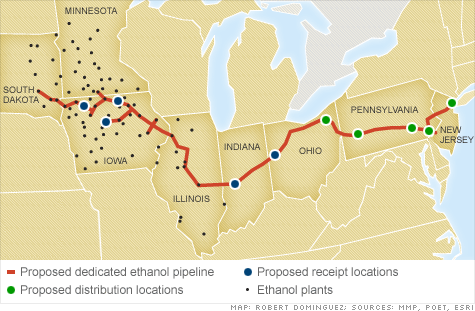
(Fortune Magazine) -- John D. Rockefeller figured out a long time ago that the most efficient way to transport liquid fuels long distances wasn't on wheels but in pipelines. Today POET, the privately held Sioux Falls, S.D., company that is the country's largest producer of ethanol, and Tulsa pipeline-builder Magellan Midstream Partners are poised to make the same leap.
They want to build a $4 billion ethanol pipeline -- the first in the U.S. and the longest in the world -- linking cornfields and refineries in the upper Midwest to fuel-hungry markets on the East Coast, while boosting transport efficiency (equivalent to reducing the carbon footprint) 30% compared with rail and nearly 90% compared with trucks.
This is a big pipe -- extending 1,800 miles, crossing seven state lines, carrying 240,000 barrels a day -- and it won't happen without an equally big boost from taxpayers. On Feb. 25, corn-state congressman Leonard Boswell (D-Iowa) reintroduced the Renewable Fuel Pipeline Act. (Similar legislation is pending in the Senate.)
The bill's key provision is an 80% government loan guarantee. Without it, says Magellan CEO Don Wellendorf, there won't be a pipeline: "We're not willing to spend the kind of money it would take on a project that's viable only as long as the government continues its interest in ethanol."
A recent study paid for by POET and Magellan (MMP) touts the pipeline's social benefits -- surprise, surprise. It relies on "final demand employment multipliers" to claim that 80,000 jobs will be created, although only 143 "directly associated" with the pipeline will remain after the two-year construction project ends. It also envisions a $6.6 billion lasting boost to the U.S. economy. Green jobs and economic stimulus: Who can argue with that?
PR aside, what's really driving the pipeline is the government's renewable-fuels mandate -- established in 2005 and expanded with fanfare by the Obama administration. The new goal: 36 billion gallons of biofuels in the U.S. fuel supply by 2022, up from 12 billion today.
Whether we'll get there is an open question. Lower oil prices since 2008 haven't helped. Nor has the damage done lately to ethanol's green cred. A recent Duke University paper found that "carbon releases from the soil after planting corn for ethanol may in some cases completely offset carbon gains ... for at least 50 years." Greener cellulosic alternatives, alas, are years away, although the pipeline could carry them as well.
Still, the policy is the policy: Production must rise. The industry expects a boost in June, when the EPA should raise the ethanol allowance in gasoline from 10% to 15%.
Yet even with the political will, obstacles remain. The watered-down bill deliberately sidesteps the toxic but critical issue of eminent domain. Maybe they could offer free fill-ups in exchange. ![]()






| Company | Price | Change | % Change |
|---|---|---|---|
| Ford Motor Co | 8.29 | 0.05 | 0.61% |
| Advanced Micro Devic... | 54.59 | 0.70 | 1.30% |
| Cisco Systems Inc | 47.49 | -2.44 | -4.89% |
| General Electric Co | 13.00 | -0.16 | -1.22% |
| Kraft Heinz Co | 27.84 | -2.20 | -7.32% |
| Index | Last | Change | % Change |
|---|---|---|---|
| Dow | 32,627.97 | -234.33 | -0.71% |
| Nasdaq | 13,215.24 | 99.07 | 0.76% |
| S&P 500 | 3,913.10 | -2.36 | -0.06% |
| Treasuries | 1.73 | 0.00 | 0.12% |
|
Bankrupt toy retailer tells bankruptcy court it is looking at possibly reviving the Toys 'R' Us and Babies 'R' Us brands. More |
Land O'Lakes CEO Beth Ford charts her career path, from her first job to becoming the first openly gay CEO at a Fortune 500 company in an interview with CNN's Boss Files. More |
Honda and General Motors are creating a new generation of fully autonomous vehicles. More |
In 1998, Ntsiki Biyela won a scholarship to study wine making. Now she's about to launch her own brand. More |
Whether you hedge inflation or look for a return that outpaces inflation, here's how to prepare. More |